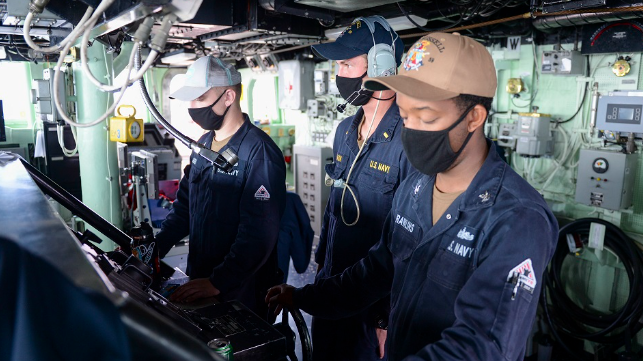USS Russell Conducts Freedom of Navigation Transit in Spratly Islands

On Wednesday, the destroyer USS Russell conducted a freedom of navigation operation (FONOP) in the Spratly Islands, marking the first challenge to China's maritime claims in the archipelago since the start of the Biden administration.
In a statement, U.S. 7th Fleet said that the operation was intended to challenge restrictions on the right of innocent passage imposed by China, Vietnam and Taiwan, which have overlapping claims in the Spratly Islands. China's holdings are by far the most developed and the most controversial: it has built up multiple full-scale military installations on Philippine-claimed land features, complete with runways and air defense systems.
China, Vietnam, and Taiwan all require either permission or advance notification before a foreign military vessel sails within waters they claim as their own. Under UNCLOS, all merchant vessels and warships have the right of innocent passage through other nations' territorial seas, generally defined by the 12 nm-from-shore baseline rule.
UNCLOS does not allow any one nation to impose an advance-notification requirement, even for a military vessel - so long as the vessel does not engage in military activities, like weapons exercises or aircraft launch and recovery. Sailing a surface combatant through an "advance-notification" zone is a method of challenging restrictions, and the U.S. Navy conducts similar operations frequently in sea lanes around the world.

that matters most
Get the latest maritime news delivered to your inbox daily.
The transit followed one week after a dual-carrier exercise involving USS Nimitz and USS Theodore Roosevelt in the South China Sea, with both carriers launching and recovering aircraft in a "highly trafficked area" in international waters. Earlier in the month, the destroyer USS John S. McCain conducted a transit of the Taiwan Strait - a particularly sensitive area for China - to demonstrate that "the United States military will continue to fly, sail and operate anywhere international law allows."
Under its sweeping "nine dash line" claim, China asserts that the overwhelming majority of the South China Sea falls within its sovereign waters, including areas hundreds of miles from Chinese shores. The Permanent Court of Arbitration in the Hague rejected this claim in 2016; China did not participate in the case in court, and it has largely ignored the outcome.
